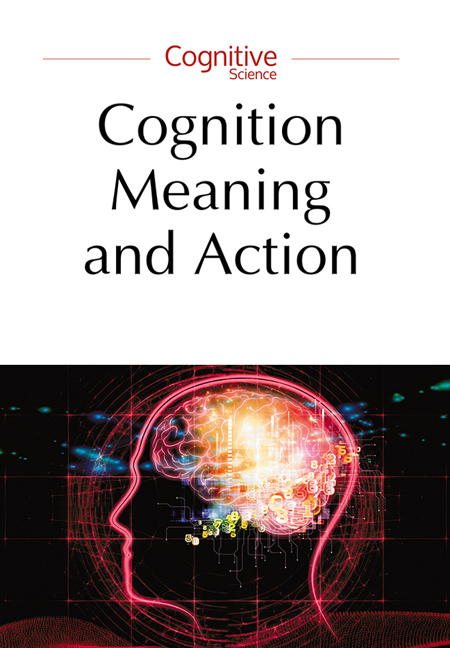Book contents
- Frontmatter
- Contents
- The crossroads of cognitive science
- Cognitive science: From computers to ant hills as models of human thought
- Two procedures expanding a linguistic competence
- Neurobiological basis for emergence of notions
- Similarity as distance: Three models for scientific conceptual knowledge
- The Approximate Numbers System and the treatment of vagueness in conceptual spaces
- Communication, cognition, and technology
- To tell and to show: The interplay of language and visualizations in communication
- Semiotics, signaling games and meaning
- Out of the box thinking
- The everyday of decision-making
- Short- and long-term social interactions from the game theoretical perspective: A cognitive approach
- Notes about Authors
Cognitive science: From computers to ant hills as models of human thought
Published online by Cambridge University Press: 10 January 2018
- Frontmatter
- Contents
- The crossroads of cognitive science
- Cognitive science: From computers to ant hills as models of human thought
- Two procedures expanding a linguistic competence
- Neurobiological basis for emergence of notions
- Similarity as distance: Three models for scientific conceptual knowledge
- The Approximate Numbers System and the treatment of vagueness in conceptual spaces
- Communication, cognition, and technology
- To tell and to show: The interplay of language and visualizations in communication
- Semiotics, signaling games and meaning
- Out of the box thinking
- The everyday of decision-making
- Short- and long-term social interactions from the game theoretical perspective: A cognitive approach
- Notes about Authors
Summary
Before cognitive science
In this introductory chapter some of the main themes of the development of cognitive science will be presented. The roots of cognitive science go as far back as those of philosophy. One way of defining cognitive science is to say that it is just naturalized philosophy. Much of contemporary thinking about the mind derives from René Descartes’ distinction between the body and the soul. They were constituted of two different substances and it was only humans that had a soul and were capable of thinking. According to him, other animals were mere automata.
Descartes was a rationalist: our minds could gain knowledge about the world by rational thinking. This epistemological position was challenged by the empiricists, notably John Locke and David Hume. They claimed that the only reliable source of knowledge is sensory experience. Such experiences result in ideas, and thinking consists of connecting ideas in various ways.
Immanuel Kant strove to synthesize the rationalist and the empiricist positions. Our minds always deal with our inner experiences and not with the external world. He introduced a distinction between the thing in itself (das Ding an sich) and the thing perceived by us (das Ding an uns). Kant then formulated a set of categories of thought, without which we cannot organize our phenomenal world. For example, we must interpret what happens in the world in terms of cause and effect.
The favourite method among philosophers of gaining insights into the nature of the mind was introspection. This method was also used by psychologists at the end of the 19th and the beginning of the 20th century. In particular, this was the methodology used by Wilhelm Wundt and other German psychologists. By looking inward and reporting inner experiences it was hoped that the structure of the conscious mind would be unveiled.
However, the inherent subjectivity of introspection led to severe methodological problems. These problems set the stage for a scientific revolution in psychology. In 1913, John Watson published an article with the title “Psychology as the behaviourist views it” which has been seen as a behaviourist manifesto. The central methodological tenet of behaviourism is that only objectively verifiable observations should be allowed as data.
- Type
- Chapter
- Information
- Cognition, Meaning and ActionLodz-Lund Studies in Cognitive Science, pp. 11 - 30Publisher: Jagiellonian University PressPrint publication year: 2015



